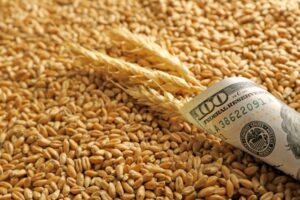
In January-October 2025, Ukrainian companies increased exports of ferrous metal scrap by 52.1% compared to the same period last year — to 345,197 tons from 226,970 tons.
According to statistics released by the State Customs Service (SCS) on Wednesday, 33,357 tons were exported in October, 28,785 tons in September, 34,713 tons in August, 44,842 thousand tons in July, a record 47,691 thousand tons in June, 28.6 thousand tons in May, 46,321 thousand tons in April, 39,908 thousand tons in March, in February – 25,284 thousand tons, in January – 15,696 thousand tons of scrap.
In monetary terms, scrap exports in January-October increased by 43.4% – to $103.052 million from $71.862 million.
During this period, scrap exports were formally carried out mainly to Poland (81.08% of shipments in monetary terms), Greece (6.19%), and Italy (5.47%).
In the first 10 months of this year, Ukraine imported 34 tons of scrap worth $13,000 from Poland (53.85%), the Seychelles (30.77%), and the British Virgin Islands (7.69%).
As reported, due to the sharp increase in exports of strategic raw materials from Ukraine, the Ministry of Economy initiated the introduction of a licensing and quota regime for scrap exports with a zero quota. A public discussion of the draft resolution is currently underway. Its implementation is expected to contribute to the smooth operation of Ukraine’s metallurgical and foundry industries, as well as to stabilize the situation with regard to meeting the demand for scrap on the domestic market of Ukraine.
In 2024, Ukraine’s scrap collection companies increased their exports of ferrous metal scrap by 60.7% compared to 2023, from 182,465 thousand tons to 293,190 thousand tons. In monetary terms, scrap exports for the year increased by 73.2% to $91.311 million from $52.723 million.

In January-October of this year, Ukrainian mining companies reduced exports of iron ore raw materials (IORM) in physical terms by 4.41% compared to the same period last year, from 27 million 790.352 thousand tons to 26 million 565.296 thousand tons.
According to statistics released by the State Customs Service (SCS) on Wednesday, foreign currency proceeds from iron ore exports decreased by 14.3% during this period, from $2 billion 341.865 million to $2 billion 7.246 million.
Exports of raw materials were mainly to China (44.49% of shipments in monetary terms), Slovakia (16.97%), and Poland (16.78%).
In addition, in January-October 2025, Ukraine imported mineral resources worth $86,000 in the amount of 118 tons from the Netherlands (51.16%), Italy (33.72%), and Norway (15.12%), while in the same period last year it imported 835 tons worth $261,000.
As reported, in 2024, Ukraine increased its exports of raw materials by 89.8% compared to 2023, to 33 million 699.722 thousand tons, and foreign exchange earnings grew by 58.7%, to $2 billion 803.223 million UAH.
In 2024, Ukraine imported mineral resources worth $414,000 in a total volume of 2,042 tons, while in 2023, 250 tons of these raw materials were imported worth $135,000. In 2023, exports of raw materials decreased by 26% in real terms compared to 2022, to 17 million 753,165 thousand tons. Foreign exchange earnings amounted to $1 billion 766,906 million (a decrease of 39.3%). A total of 250 tons of raw materials were imported for $135,000.

According to the results of January-October 2025, Poland, Turkey, and Germany remain Ukraine’s largest export destinations. The volume of supplies to Poland amounted to $4.2 billion, to Turkey – $2.2 billion, to Germany – $2.0 billion, according to the State Customs Service.
Food products lead the export structure with $18.2 billion, metals and metal products with $3.9 billion, and machinery, equipment, and transport with $3.1 billion. UAH 950.7 million was paid to the budget for the clearance of goods subject to export duties.
According to the State Customs Service, total exports for 10 months decreased by 4.05% to $33.2 billion.

Ukraine exported 3.2 million tons of grains and oilseeds in the first four months of the 2025-2026 marketing year (MY, July-June), according to the Ukrainian Grain Association on Facebook.
According to the infographic, exports were most active in August (3.3 million tons) and October (3.21 million tons). At the same time, exports in October exceeded September figures (2.4 million tons) by 32%.
Wheat sales peaked in August at 2.048 million tons, which is 36.5% more than in October (1.5 million tons). Barley exports were also most active in August (324,000 tons), which is 36.1% more than in September (238,000 tons) and 62% more than in October (200,000 tons).
Corn exports, on the other hand, picked up in October and reached 1.094 million tons, significantly more than the September figure of 61 thousand tons and the August figure of 230 thousand tons.
Foreign trade in soybeans also picked up in October – 230 thousand tons, compared to 78 thousand tons in September and 208 thousand tons in August this year.
Rapeseed exports were most active in August – 519 thousand tons, while in September and October, 220 thousand tons and 177 thousand tons were delivered to foreign markets, respectively.

Rapeseed exports from Ukraine in October will not exceed 135-140 thousand tons, compared to 535 thousand tons last year (-73.8%). As of October 28, 125 thousand tons have already been exported, according to the analytical cooperative “Pusk,” created within the framework of the All-Ukrainian Agrarian Council (VAR).
“Exports are moving very slowly—everything is hampered by duties. It is they that have effectively stopped the normal work of exporters,” analysts noted.
At the same time, they noted that domestic processing volumes are growing.
“In September, we processed more than 100,000 tons of rapeseed, and in October, the figure will be no less. Against the backdrop of problems with sunflower, rapeseed is currently supporting the sector. Rapeseed prices in ports are quoted in the range of EUR 540-545/ton. At the same time, processors offer from UAH 25,000/ton and above,” analysts noted.
The European market is showing positive price dynamics.
“Over the past week, rapeseed exchange quotations have risen by EUR 10. January-February is traditionally expected to be the period of highest prices for this oilseed crop,” added Pusk.